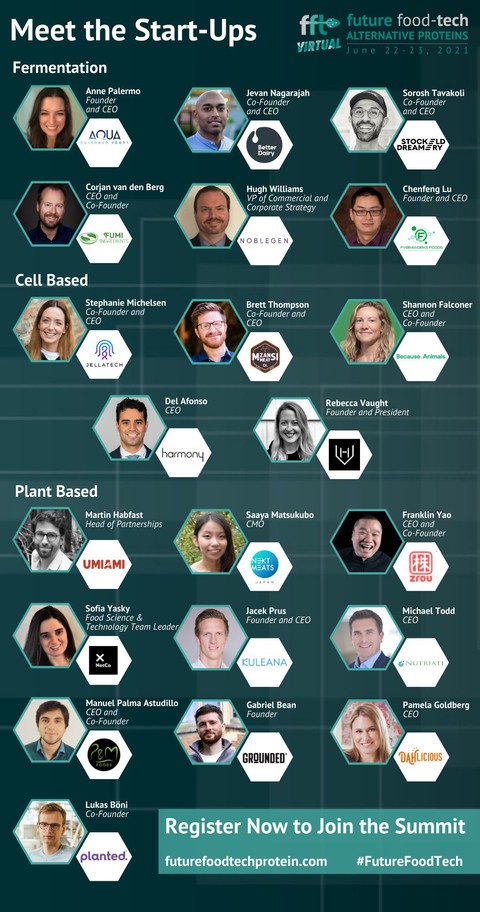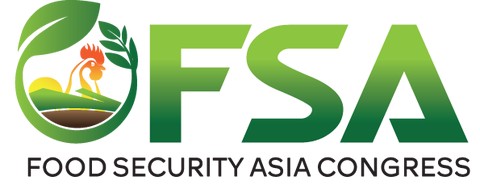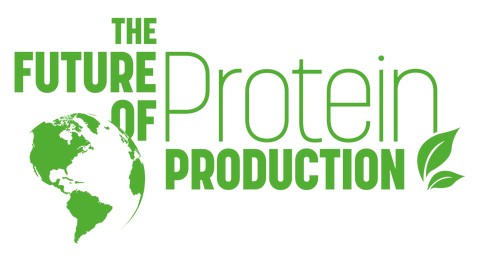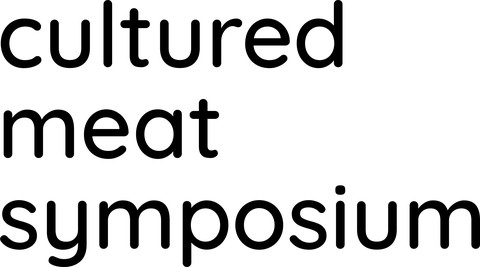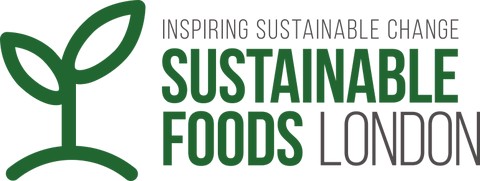21 Innovators Advancing Alternative Proteins
May 28, 2021 - 8 min read
The growing appetite for sustainable proteins is fueling demand for new product choices, driving innovators to unlock new scalable solutions. Disruptive technologies from emerging start-ups are critical to building the future of protein.
At Future Food-Tech Alternative Proteins on June 22-23, the summit will spotlight twenty one game-changing solutions in the summit’s Start-Up Arena, Innovation Challenge Finale with Quorn Foods and Roquette, Start-Up TechHub, Fireside Chats and Step-Up to the Plate cooking demonstrations.
The organizers have scoured the globe to find trailblazers in alternative proteins, across fermentation, cell-based and plant-based solutions, and will spotlight emerging technology pioneers from South Africa, USA, Canada, China, Chile, Japan, France, the Netherlands, Sweden and the UK.
“We’re delighted to showcase the most exciting emerging talent and fresh solutions within the alternative protein space and can’t wait to welcome our international start-ups to the summit,” says Jet Luckhurst, Start-Up Partnerships Manager at Future Food-Tech.
Meet the exciting crop of globe-spanning alternative protein talent:
Fermentation - Seafood
“Aqua Cultured Foods (USA) has created the first whole-cut seafood alternative using fermentation. What makes this so exciting is that our proprietary strain of fungi is grown and not processed. Allowing it to have superior nutrition to other plant-based alternatives while maintaining the familiar texture of traditional seafood,” explains Anne Palermo, Founder and CEO.
Fermentation - Dairy
"Sustainably produced cheese that also has the flavor, texture and appeal of traditional cheese has been unachievable until now. Better Dairy (UK) is leveraging precision fermentation to bring high quality animal-free cheese to life whilst building out a rolodex of computational tools enabling them to pave a clearer path towards price-parity with traditional options," says Jevan Nagarajah, CEO.
"So far, plant-based cheese hasn't captured any meaningful market share, because existing products haven't met consumer expectations in terms of price, taste, and nutrition. Stockeld Dreamery (Sweden) is creating the world's most ambitious cheese, which is why we're building the world's largest R&D team for plant-based cheese, and a brand that people care about," shares Sorosh Tavakoli, CEO and Co-Founder.
Fermentation – Ingredients
“FUMI Ingredients (the Netherlands) develops animal-free food ingredients from natural micro-organisms. We believe that microorganisms are an untapped source of high-value functional ingredients, which can be used to make new textures in healthy and sustainable food products,” explains Corjan van den Berg, CEO and Co-Founder.
“Noblegen (Canada) makes nutritious food with the lowest ecological footprint for a world that desperately needs to revamp the way it grows, manufacturers and thinks about food. We do this with our breakthrough, proprietary technology that enables us to efficiently cultivate an overlooked food source called Euglena,” details Hugh Williams, VP of Commercial and Corporate Strategy.
Fermentation - Meat
“Plant-based meat alternatives are great solutions to replace animal meat consumption, but the hydrocolloid-based additives that are used in these products are not great. At Fybraworks (USA) we are working hard to replace these additives with fermentation-based meat proteins. This will result in a cleaner labelled product with nutrition and taste that closely matches the animal meat. Fybraworks: real meat taste, real world solutions,” shares Chenfeng Lu, Founder and CEO.
Cell Based – Collagen/Gelatin
"Currently, there are companies on similar missions to produce animal-free collagen, but their process involves fermentation technology which only produces collagen peptides (part of the protein). What makes JellaTech’s (the Netherlands) technology revolutionary is that we are able to produce native collagen using animal cells in a sustainable way, which allows our collagen to have its full functionality**,"** details Stephanie Michelsen, Co-Founder and CEO.
Cell Based - Meat
“We’re Mzansi Meat Co. (South Africa) and we make meat in Africa, the first company to bring cellular agriculture to the continent. Our team of scientists will be working together with local nguni and indigenous cattle farmers to grow their output and make meat that is healthy and accessible. We aim to be part of the solution in securing food in South Africa and the continent,” outlines Brett Thompson, Co-Founder and CEO.
Cell Based - Pet Food
“Because, Animals (USA) is creating the most sustainable, humane, and nutritious pet food on the planet. By growing small-prey species of cultured meat – without the inclusion of antibiotics or growth-promoting steroids! Because, Animals is creating safer pet foods made with meat that pets in the wild would naturally eat,” shares Shannon Falconer, CEO and Co-Founder.
Cell Based - Substrates
“Van Heron Labs (USA) is disrupting alternative protein through one central focus: optimizing cellular health. Using an innovative bioinformatics pipeline and multi-omics data, the VHL platform analyzes and streamlines metabolism to produce superior growth and performance for any cell type, reducing costs and dependence on animal products,” explains Rebecca Vaught, Founder and President.
Cell Based - Baby Formula
“Harmony (USA) is a food science-based company applying cutting-edge biotechnology to mimic the composition of human breast milk and create the next generation of infant formulas. Nowadays we have over 22 millions of formula allergic babies/year worldwide. Harmony produces breast milk protein-based formulas which are animal-free, allergy-free and environmentally friendly,” notes Del Afonso, CEO.
Plant Based - Meat
“Until now, there were only two options: dry extrusion to create minced products such as steaks or sausages, and wet extrusion to create small chicken-like pieces. However, no technology allowed to create thick fibrous whole cuts of meat. This is now possible with Umiami’s (France) unique texturization platform that allows creating thick fibrous whole-cuts in which we master both the direction and the thickness of fibers. And it is cleaner-label, too!” states Martin Habfast, Head of Partnerships.
"Global and Chinese consumers are more and more interested in eating healthier, and Zrou, by YouKuai Group (China) has created one of the most (if not the most) clean-labeled plant-based meat product currently in the market, and we will stick to the clean label principle in future product development," notes Franklin Yao, CEO and Co-Founder.
“Next Meats (Japan) is thrilled to present the world's first plant-based Yakiniku barbecue meat, the NEXT Yakiniku! Japan has a rich history of plant-based cuisine, but we’re underrepresented in the global alt-meat space. Using our authentic Japanese flavors and unique production know-how to simulate realistic, meat-like textures, we hope to bring our culinary expertise to the forefront of this emerging market,” explains Saaya Matsukubo, CMO.
“At Planted (Switzerland) we turn very few and natural ingredients into delicious meats from plants. Operating our own production and research facilities, we’re passionate and ambitious to create the tastiest innovations at speed and scale,” details Lukas Böni, Co-Founder.
Plant Based – Dairy and Meat
“NotCo (Chile) is the only global company that has generated a paradigm shift in the mass consumption food industry, simultaneously breaking into plant-based products in categories such as dairy, eggs and meat. Our application solves a current problem in an innovative way, bringing plant-based products closer to animal-based products in terms of the whole consumer experience," shares Sofia Yasky, Food Science & Technology Team Leader.
Plant Based - Seafood
Kuleana (USA) is currently patenting biotechnology approaches for creating unprocessed formats of meat. It is based on enzymatic processes that replicate the appearance and nutritional profile of raw unprocessed fish. Our technology is cost-effective and GRAS so we’ve a faster route to market compared to most processes using recombinant proteins or cell-based technology,” details Jacek Prus, Founder and CEO.
Plant Based - Ingredients
"The demand for alternative proteins has never been higher, but the market relies primarily on soybeans and yellow peas. Brands have had to rely on what is commercially scaled instead of what is best in terms of taste, texture, or sustainability. The next era of alternative proteins needs new performance options for brands. Processing innovations have opened up those options," says Michael Todd, CEO at Nutriati (USA).
“P&M (Chile) food matrixes combine ingredients that create mixes with full and balance nutritional profile and good taste since our technology lets us mask vegetal origin ingredients’ flavors that may not be appealing or present textures that are not attractive to some consumers. We use vegetal ingredients that pose a demonstrated positive effect on human health without sacrificing the great experience of eating,” explains Manuel Palma Astudillo, CEO and Co-Founder.
Plant Based - Drinks
“At GROUNDED (UK), we’ve made a totally natural protein shake, entirely from plants + with absolutely no rubbish in it. Our packaging is also made from plants. In a category riddled with synthetic ingredients, our shakes stand out as the cleanest available protein shakes on the market,” shares Gabriel Bean, Founder.
Plant Based - Prebiotic Yoghurts
"Dahlicious (USA) leverages a centuries-old tradition of “slow-culturing,” meaning our yogurts are cooked at a lower temperature for a longer period, creating the most luxurious creamy texture and a high level of probiotics. This technique is leveraged across both our dairy and plant-based lines, including almond, coconut, and oat," shares Pamela Goldberg, CEO.
Over 150 game-changing early and mid-stage companies will join the 900-strong virtual audience at the Future Food-Tech Alternative Proteins summit on June 22-23. The summit will bring together food brands, retailers, ingredient manufacturers, technology providers and investors for two days of high impact online networking and knowledge-exchange to map out and accelerate the future of protein.
The full program, speaking faculty and delegate registration are available now at www.futurefoodtechprotein.com
Note to Editors:
Hosted by Rethink Events, Future Food-Tech summits take place three
times a year in San Francisco, New York and London, plus also in
Singapore as part of the Asia-Pacific Agri-Food Innovation Summit. At
present the summits are being held virtually to connect our global
audiences. The summits generate valuable opportunities for networking,
knowledge exchange and deal-making among Future Food-Tech’s
international network of food businesses, retailers, technology
providers, entrepreneurs and investors. https://futurefoodtech.com/
